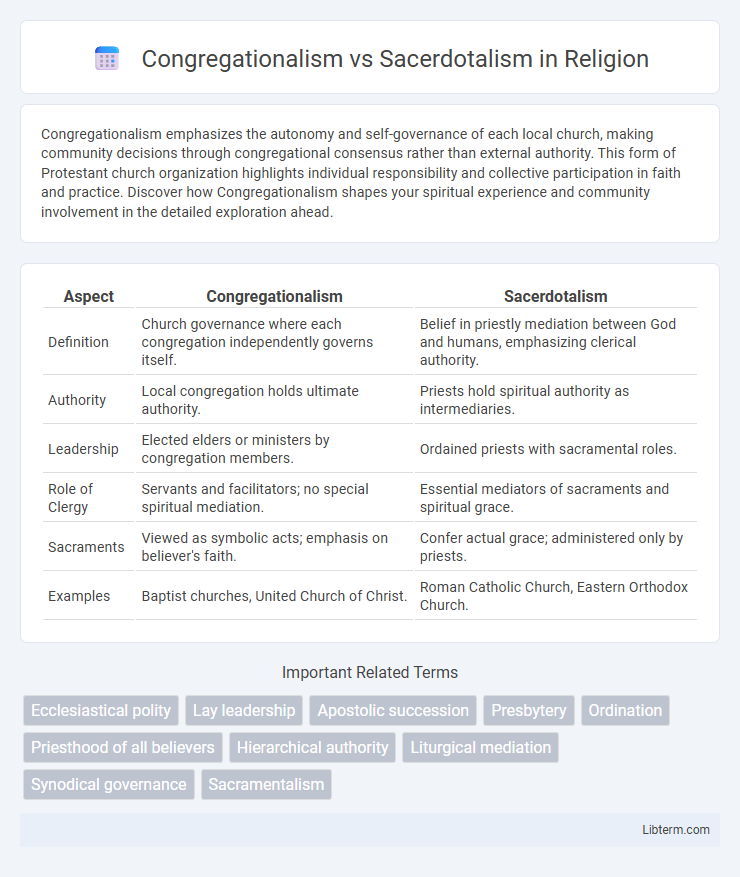Congregationalism emphasizes the autonomy and self-governance of each local church, making community decisions through congregational consensus rather than external authority. This form of Protestant church organization highlights individual responsibility and collective participation in faith and practice. Discover how Congregationalism shapes your spiritual experience and community involvement in the detailed exploration ahead.
Table of Comparison
| Aspect | Congregationalism | Sacerdotalism |
|---|---|---|
| Definition | Church governance where each congregation independently governs itself. | Belief in priestly mediation between God and humans, emphasizing clerical authority. |
| Authority | Local congregation holds ultimate authority. | Priests hold spiritual authority as intermediaries. |
| Leadership | Elected elders or ministers by congregation members. | Ordained priests with sacramental roles. |
| Role of Clergy | Servants and facilitators; no special spiritual mediation. | Essential mediators of sacraments and spiritual grace. |
| Sacraments | Viewed as symbolic acts; emphasis on believer's faith. | Confer actual grace; administered only by priests. |
| Examples | Baptist churches, United Church of Christ. | Roman Catholic Church, Eastern Orthodox Church. |
Understanding Congregationalism: Key Principles
Congregationalism centers on the autonomy of each local church, emphasizing the priesthood of all believers and democratic decision-making within the congregation. Unlike sacerdotalism, which upholds a hierarchical clergy with exclusive spiritual authority, Congregationalism rejects a rigid clerical structure and stresses direct access to God by all members. Core principles include self-governance, accountability to the congregation, and the belief that pastoral authority is derived from the collective body rather than an ordained priesthood.
Defining Sacerdotalism and Its Core Beliefs
Sacerdotalism centers on the belief that priests serve as essential mediators between God and humans, possessing the authority to perform sacred rites and administer sacraments necessary for salvation. This doctrine emphasizes the priesthood's unique spiritual role and the efficacy of rituals such as the Eucharist and confession in dispensing divine grace. Sacerdotalism maintains that these clerical functions are ordained and indispensable within the structure of the Church, contrasting with Congregationalism's focus on direct, individual access to God.
Historical Origins and Development of Both Traditions
Congregationalism originated in the early 17th century within English Puritanism as a reaction against hierarchical church governance, emphasizing the autonomy of local congregations and the priesthood of all believers. Sacerdotalism has roots in the early Christian church, particularly in the Catholic and Orthodox traditions, where ordained priests function as essential mediators of divine grace through sacraments and liturgical rites. The development of Congregationalism underscored democratic ecclesiology and individual spiritual authority, whereas Sacerdotalism reinforced clerical hierarchy and sacramental mediation as foundational to church identity and worship.
Authority in Congregationalism: The Role of the Local Church
In Congregationalism, authority resides primarily within the local church, where members collectively govern and make decisions without hierarchical oversight. This autonomy ensures that the congregation holds the power to ordain ministers, manage affairs, and interpret doctrine independently. The decentralized structure contrasts sharply with Sacerdotalism, which places authority in the hands of a priestly class or ecclesiastical hierarchy.
Clergy and Sacraments: Sacerdotalism’s Mediating Role
Sacerdotalism emphasizes the clergy's unique mediating role in administering sacraments, viewing priests as essential intermediaries between believers and the divine. This belief underscores the necessity of ordained ministers to perform sacraments, which are considered channels of grace inaccessible without clerical authority. In contrast, Congregationalism promotes the priesthood of all believers, minimizing hierarchical mediation and often allowing lay participation in sacramental rites.
Worship Practices: Comparing Congregational and Sacerdotal Approaches
Congregational worship emphasizes active lay participation, with members contributing to prayers, readings, and hymns, fostering a communal and egalitarian atmosphere. Sacerdotal worship centers on the priest's role as mediator, performing sacramental rites and liturgies that convey divine grace, often through formal rituals and sacred vestments. These contrasting practices reflect Congregationalism's focus on collective spiritual agency versus Sacerdotalism's emphasis on clerical authority and sacramental intercession.
Community and Participation: Lay Involvement in Both Systems
Congregationalism emphasizes direct lay involvement, with community members actively participating in decision-making and worship leadership, fostering a democratic and inclusive church environment. In contrast, Sacerdotalism centers on the clergy's mediating role between the congregation and the divine, limiting lay participation primarily to attendance and support roles rather than governance or liturgical functions. This distinction highlights Congregationalism's focus on communal empowerment versus Sacerdotalism's hierarchical structure prioritizing ordained clergy authority.
Theological Foundations: Scriptural Interpretations
Congregationalism emphasizes the priesthood of all believers, grounding its theological foundation in scriptural interpretations like 1 Peter 2:9 and Hebrews 10:24-25, which highlight direct access to God and the communal authority of the congregation. Sacerdotalism relies on passages such as Hebrews 5:1-4 and John 20:22-23 to support the sacerdotal role, emphasizing the mediatory function of ordained priests who administer sacraments and intercede on behalf of believers. These contrasting biblical interpretations shape the ecclesiological structures and the understanding of spiritual authority within each tradition.
Impact on Christian Unity and Church Governance
Congregationalism emphasizes local church autonomy, allowing each congregation to govern itself without external ecclesiastical authority, which can lead to diverse interpretations and practices, potentially challenging broader Christian unity. Sacerdotalism, with its hierarchical priestly system and sacramental authority vested in clergy, promotes centralized governance that fosters uniformity and doctrinal consistency across churches, strengthening institutional unity. The contrasting governance models affect how churches relate internally and externally, with Congregationalism favoring decentralized decision-making and Sacerdotalism enabling cohesive oversight and canonical order.
Contemporary Relevance: Congregationalism vs Sacerdotalism Today
Contemporary relevance of Congregationalism vs Sacerdotalism centers on governance and religious authority; Congregationalism emphasizes local church autonomy and lay participation, appealing to modern democratic values and grassroots engagement. Sacerdotalism maintains clerical hierarchy and sacramental mediation, resonating with traditions prioritizing ordained ministry and liturgical continuity. These differing approaches influence debates on church authority, community involvement, and theological emphasis in today's diverse Christian landscapes.
Congregationalism Infographic

 libterm.com
libterm.com